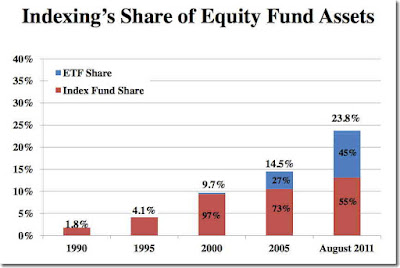Vanguard's "How America Invests" offers a look at the behavior of five million households that invest with the firm. As you would expect, investors are moving into index funds and away from actively managed products. Some wealthier Vanguard customers are using exchange traded funds to add diversification, but the real fans of ETFs are the young.
Most households who currently invest in ETFs are “diversifiers,” meaning ETFs make up less than a quarter of their assets. Their ETF investments are in addition to already-diversified mutual fund portfolios. These households tend to be wealthy and long- tenured. However, there's a small but growing group of ETF “enthusiasts,” typically millennials who have been with Vanguard for only three years, who build complete portfolios from ETFs.










